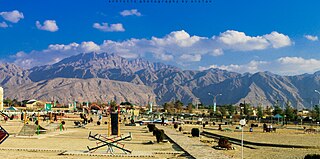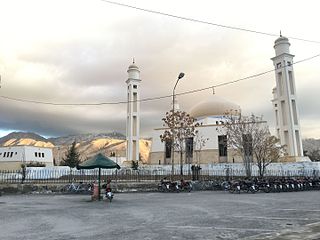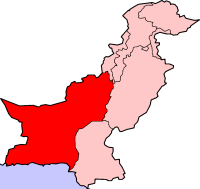Related Research Articles

Balochistan is a province of Pakistan. Located in the southwestern region of the country, Balochistan is the largest province of Pakistan by land area but is the least populated one. It is bordered by the Pakistani provinces of Khyber Pakhtunkhwa to the north-east, Punjab to the east and Sindh to the south-east; shares international borders with Iran to the west and Afghanistan to the north; and is bound by the Arabian Sea to the south. Balochistan is an extensive plateau of rough terrain divided into basins by ranges of sufficient heights and ruggedness. It has the world's largest deep sea port, the Port of Gwadar lying in the Arabian Sea.

Quetta is the capital and largest city of the Pakistani province of Balochistan. It is the tenth largest city in Pakistan, with a population of over 1.1 million. It is situated in the south-west of the country, lying in a valley surrounded by mountains on all sides. Quetta is at an average elevation of 1,680 metres above sea level, making it Pakistan's only high-altitude major city. The city is known as the "Fruit Garden of Pakistan" due to the numerous fruit orchards in and around it and the large variety of fruits and dried fruits produced there.

Quetta is a district in the north-west of the Balochistan province of Pakistan, on the border with Kandahar province, Afghanistan. It is part of Quetta Division. The district is famous for its agriculture produce, most notably fruit orchards but also including apples and grapes. The Hanna Valley is an area where almonds are grown. The population counted in the 1998 census was 760,000, while in 2010 it was estimated at 1,235,000.

The Government of Balochistan is the provincial government of the largest province of Balochistan, Pakistan in Quetta. The head of the province is the Governor, who is nominated by the President of Pakistan. The chief executive of the Government of Balochistan is the Chief Minister who is elected by the Balochistan Assembly and the administrative boss of the province is the Chief Secretary of Balochistan who is appointed by the Prime Minister of Pakistan.

Quetta International Airport ;(IATA: UET, ICAO: OPQT) is located at Quetta, the provincial capital of Balochistan, Pakistan. The airport is the fourth highest airport in Pakistan. It is the second largest airport in the south region of the country and the largest for the province of Balochistan. It is situated 12 km south-west of the city, spread over an area of 35 acres (14 ha). Average scheduled flights were 1332, non-scheduled flights 247, and the total recorded passenger flow was 152,698 in 2007.

The Pashtunkhwa Milli Awami Party, abbreviated as PMAP or PKMAP, is a political party in Pakistan's Balochistan province. It was founded by Mahmood Khan Achakzai, who was elected as the chairman, and Sher Ali Bacha, who served as the General Secretary, in March 1989 in Quetta.

There are five high courts of Pakistan, each based in the capital city of the four provinces, plus one in the federal capital, Islamabad. Articles 192 to 203 of the Constitution of Pakistan outline the constitution of the courts, appointment of the judges, their oath of office, and jurisdiction of the high courts.
According to the United States Energy Information Administration (EIA), Pakistan may have over 9 billion barrels (1.4×109 cubic metres) of petroleum oil and 105 trillion cubic feet (3.0 trillion cubic metres) in natural gas (including shale gas) reserves.

The Balochistan High Court is the highest judicial institution of Balochistan, Pakistan. The court is formally known as the High Court of Balochistan. It is situated in the provincial capital, Quetta.

Balochistan Police or Baloch Police is responsible for policing urban Balochistan, Pakistan. Its strength is 150,000 as of 2023.The current Inspector General of Police, Balochistan is Rao Sardar Ali Khan.

The 2011 Balochistan floods started from the last week of February and continued until the first week of March. Balochistan province was already badly affected from last year's devastating floods as UNHCR claims that 166,000 flood victims are still homeless in the province with 240 people still living in camps.

The Pakistan Canoe and Kayak Federation (PCKF) is the official national governing body for canoeing and kayaking Olympic sports in Pakistan. Its function is to promote sporting activities and events for canoe and kayak paddlers across the country on a national and international level. PCKF is a non-profit organisation, which represents all people and organisations with a genuine interest in canoeing, kayaking and associated sports, helping them to increase the profile of these sports across Pakistan.

The persecution of Hazaras in Quetta, is a series of ethnic or religious motivated attacks on Hazaras in Quetta, Pakistan. Terrorist organisations like Lashkar-e-Jhangvi or Lashkar-e-Taiba have often accepted responsibility for conducting attacks on Hazaras in Pakistan.

PB-43 Quetta-VII is a constituency of the Provincial Assembly of Balochistan.

On 8 August 2016, terrorists attacked the Government Hospital of Quetta in Pakistan with a suicide bombing and shooting. They killed more than 70 people, mainly lawyers, and injured more than 130 others. The fatalities were mainly advocates (lawyers) who had assembled at the hospital where the body of Advocate Bilal Anwar Kasi, the president of the Balochistan Bar Association, was brought after he was shot dead by an unknown gunman. Responsibility for the attack has been claimed by various Islamist groups like Jamaat-ul-Ahrar and the Islamic State. Between 70 and 94 people were killed and over 120 injured. 54 of those killed were lawyers.
Terrorist incidents in Pakistan in 2018 include:
The 2019 Quetta bombing was a suicide bomb attack on an open marketplace in Quetta, Pakistan on 12 April, killing 21 people. The bombing took place near an area where many minority Shiite Muslims live. At least ten Hazara, including nine Shiites, were among the dead. Two paramilitary soldiers were also killed in the bombing. PM Imran Khan expressed condolences for the lives lost, directed the authorities to ensure the best medical treatment for the injured, and ordered an increase in security for Shiites and Hazara people. Lashkar-e-Jhangvi and ISIL later accepted responsibility for the attack, stating that "their target were Hazara people."

Jalila Haider is a Pakistani human rights attorney and political activist from Quetta in Balochistan, Pakistan. She is known to be the first woman lawyer from Quetta's Hazara minority, and an advocate for the rights of her persecuted community. She is a member of the Awami Workers Party (AWP), leader of the Balochistan chapter of Women Democratic Front (WDF), and also an activist in the Pashtun Tahafuz Movement (PTM). She founded a non-profit organisation, "We the Humans – Pakistan," which aims to empower local communities in Balochistan by strengthening opportunities for vulnerable women and children.
Chaudhry Ejaz Yousaf is a Pakistani retired judge and lawyer who served as the 10th chief justice of the Federal Shariat Court from 9 May 2003 to 8 May 2006.
The Frontier Corps Balochistan (North) (Urdu: فرنٹیئر کور بلوچستان (شمالی), reporting name: FCB(N)), is a group of paramilitary regiments of Pakistan, operating in the northern part of the province of Balochistan, to overseeing the country's borders with Afghanistan and assisting with maintaining law and order. It is one of four Frontier Corps with the others being: FC Khyber Pakhtunkhwa (North) and FC Khyber Pakhtunkhwa (South) stationed in Khyber Pakhtunkhwa province, and FC Balochistan (South) stationed in the southern part of Balochistan province.
References
- ↑ "About QDA". qda.gob.pk. Retrieved 2021-04-12.
- ↑ "Quetta Development Authority – Government of Balochistan". balochistan.gov.pk. Retrieved 2021-04-12.
- ↑ "Govt approves Rs1bn package for Quetta gas pipelines - Profit by Pakistan Today". profit.pakistantoday.com.pk. Retrieved 2021-04-12.